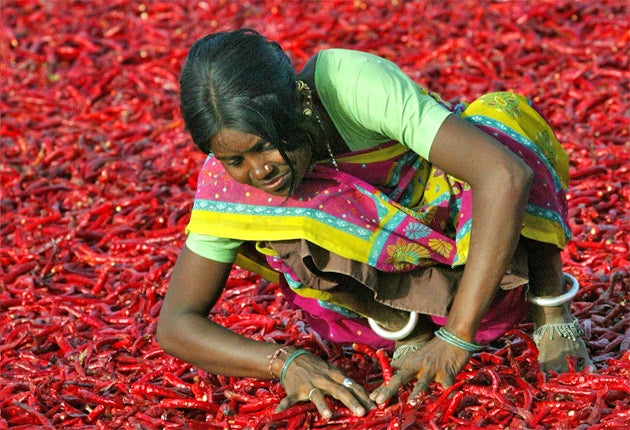Chilli may lower blood pressure, scientists say

Your support helps us to tell the story
From reproductive rights to climate change to Big Tech, The Independent is on the ground when the story is developing. Whether it's investigating the financials of Elon Musk's pro-Trump PAC or producing our latest documentary, 'The A Word', which shines a light on the American women fighting for reproductive rights, we know how important it is to parse out the facts from the messaging.
At such a critical moment in US history, we need reporters on the ground. Your donation allows us to keep sending journalists to speak to both sides of the story.
The Independent is trusted by Americans across the entire political spectrum. And unlike many other quality news outlets, we choose not to lock Americans out of our reporting and analysis with paywalls. We believe quality journalism should be available to everyone, paid for by those who can afford it.
Your support makes all the difference.Spicy food flavoured with hot chilli peppers contains a natural chemical ingredient that may lower blood pressure, according to a study on a strain of laboratory rats with hypertension.
Scientists have discovered that the long-term ingestion of capsaicin, the ingredient in chillies that makes them taste hot, can reduce blood pressure – at least in rats.
Previous studies have produced mixed results when it comes to finding a link between hot chillis and blood pressure, but this may be because they were carried out over relatively short time periods, the scientists said.
The latest findings are the first to establish a link between the ingestion of capsaicin over a longer period of time and a subsequent lowering of blood pressure in animals genetically predisposed to having hypertension.
"We found that long-term dietary consumption of capsaicin, one of the most abundant components in chilli peppers, could reduce blood pressure in genetically hypertensive rats," said Zhiming Zhu of Third Military Medical University in Chongqing, China.
The study, published in the journal Cell Metabolism, suggests that capsaicin works by activating a special "channel" in the lining of the blood vessels called the transient receptor potential vanilloid 1 (TRPV1). When the channel is activated, it increases the production of nitric oxide in the blood vessels that is believed to protect against inflammation and other vascular problems.
The scientists said the study on the rats now needs to be confirmed by analysing any epidemiological association between eating chilli peppers and blood pressure. Dr Zhu said one clue came from China, where the prevalence of hypertension is greater than 20 per cent in the north-eastern regions of the country, but between 10 and 14 per cent in souther-western regions such as Sichuan where spicy food is more commonly eaten.
"People in these regions like to eat hot and spicy foods with a lot of chilli peppers. For example, a very famous local food in my hometown, Chongqing, is the spicy hot pot," Dr Zhu said.
He added that eating hot, spicy food may not be necessary to gain the benefits of chillis because similar compounds are present in sweet peppers. There is, for instance, a mild Japanese pepper, which contains a compound called capsinoid that is closely related to capsaicin. "Limited studies show that these capsinoids produce effects similar to capsaicin. I believe that some people can adopt this sweet pepper," Dr Zhu said.
Join our commenting forum
Join thought-provoking conversations, follow other Independent readers and see their replies
Comments